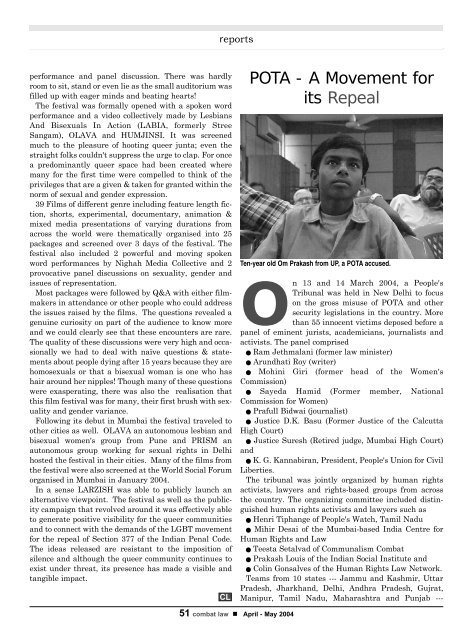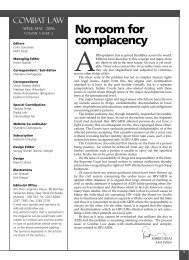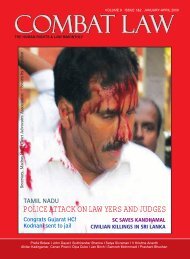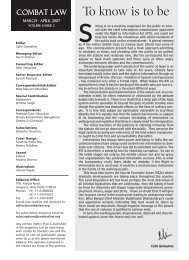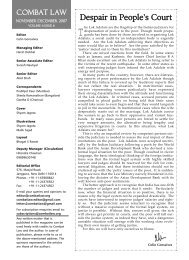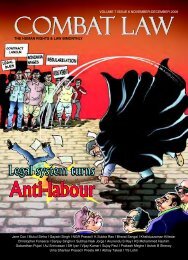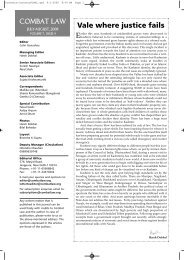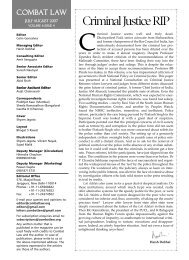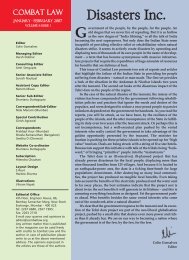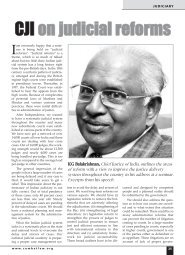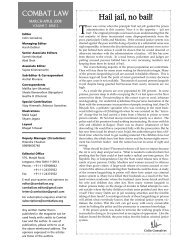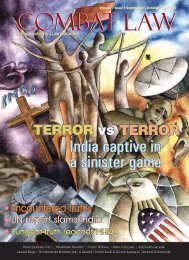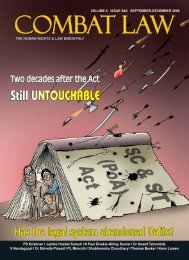PDF, 1.1MB - Combat Law
PDF, 1.1MB - Combat Law
PDF, 1.1MB - Combat Law
You also want an ePaper? Increase the reach of your titles
YUMPU automatically turns print PDFs into web optimized ePapers that Google loves.
eportsperformance and panel discussion. There was hardlyroom to sit, stand or even lie as the small auditorium wasfilled up with eager minds and beating hearts!The festival was formally opened with a spoken wordperformance and a video collectively made by LesbiansAnd Bisexuals In Action (LABIA, formerly StreeSangam), OLAVA and HUMJINSI. It was screenedmuch to the pleasure of hooting queer junta; even thestraight folks couldn't suppress the urge to clap. For oncea predominantly queer space had been created wheremany for the first time were compelled to think of theprivileges that are a given & taken for granted within thenorm of sexual and gender expression.39 Films of different genre including feature length fiction,shorts, experimental, documentary, animation &mixed media presentations of varying durations fromacross the world were thematically organised into 25packages and screened over 3 days of the festival. Thefestival also included 2 powerful and moving spokenword performances by Nighah Media Collective and 2provocative panel discussions on sexuality, gender andissues of representation.Most packages were followed by Q&A with either filmmakersin attendance or other people who could addressthe issues raised by the films. The questions revealed agenuine curiosity on part of the audience to know moreand we could clearly see that these encounters are rare.The quality of these discussions were very high and occasionallywe had to deal with naïve questions & statementsabout people dying after 15 years because they arehomosexuals or that a bisexual woman is one who hashair around her nipples! Though many of these questionswere exasperating, there was also the realisation thatthis film festival was for many, their first brush with sexualityand gender variance.Following its debut in Mumbai the festival traveled toother cities as well. OLAVA an autonomous lesbian andbisexual women's group from Pune and PRISM anautonomous group working for sexual rights in Delhihosted the festival in their cities. Many of the films fromthe festival were also screened at the World Social Forumorganised in Mumbai in January 2004.In a sense LARZISH was able to publicly launch analternative viewpoint. The festival as well as the publicitycampaign that revolved around it was effectively ableto generate positive visibility for the queer communitiesand to connect with the demands of the LGBT movementfor the repeal of Section 377 of the Indian Penal Code.The ideas released are resistant to the imposition ofsilence and although the queer community continues toexist under threat, its presence has made a visible andtangible impact.CLPOTA - A Movement forits RepealTen-year old Om Prakash from UP, a POTA accused.On 13 and 14 March 2004, a People'sTribunal was held in New Delhi to focuson the gross misuse of POTA and othersecurity legislations in the country. Morethan 55 innocent victims deposed before apanel of eminent jurists, academicians, journalists andactivists. The panel comprised Ram Jethmalani (former law minister) Arundhati Roy (writer) Mohini Giri (former head of the Women'sCommission) Sayeda Hamid (Former member, NationalCommission for Women) Prafull Bidwai (journalist) Justice D.K. Basu (Former Justice of the CalcuttaHigh Court) Justice Suresh (Retired judge, Mumbai High Court)and K. G. Kannabiran, President, People's Union for CivilLiberties.The tribunal was jointly organized by human rightsactivists, lawyers and rights-based groups from acrossthe country. The organizing committee included distinguishedhuman rights activists and lawyers such as Henri Tiphange of People's Watch, Tamil Nadu Mihir Desai of the Mumbai-based India Centre forHuman Rights and <strong>Law</strong> Teesta Setalvad of Communalism <strong>Combat</strong> Prakash Louis of the Indian Social Institute and Colin Gonsalves of the Human Rights <strong>Law</strong> Network.Teams from 10 states --- Jammu and Kashmir, UttarPradesh, Jharkhand, Delhi, Andhra Pradesh, Gujrat,Manipur, Tamil Nadu, Maharashtra and Punjab ---51 combat law • April - May 2004


